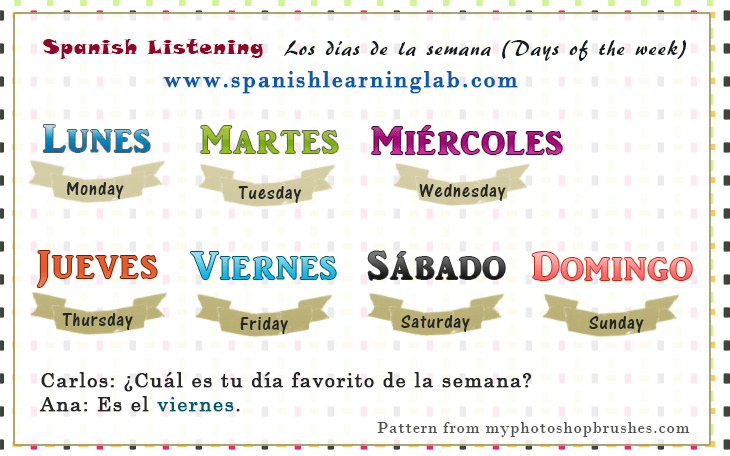LOS DÍAS DE LA SEMANA or the days of the week in Spanish are very easy to learn and remember. In this lesson, you will learn how to say the days of the week and how to use them in simple sentences and questions. We have included a nice video about this topic and some short conversations as well. These conversations will help you learn the vocabulary in real situations and they are also a great opportunity to practice Spanish listening.
Introductory video: The 7 days of the week in Spanish – Los días de la semana
This short video includes a list of days in Spanish and also several useful phrases and questions related to them that will be used in conversations later. The expression LOS DIAS DE LA SEMANA corresponds to the days of the week in Spanish. A simple variation could be LOS SIETE DIAS DE LA SEMANA (adding the number SIETE to the expression). Make sure you understand the content of the video as it will certainly be useful throughout the lesson. If you need to translate or check writing, please activate the closed captions (cc).
Talking about days of the week in Spanish: phrases and conversations
Writing the days of the week in Spanish
The seven days of the week in Spanish are: lunes, martes, miércoles, jueves, viernes, sábado y domingo. Notice that you must not capitalize days of the week in Spanish. Most of the time, we will use the definite articles EL and LOS before days in Spanish.

Asking for and saying days in Spanish
The word “Días” is used for saying days in Spanish. In order to ask “What day is today?” in Spanish, you can use the question: ¿Qué día es hoy? (What day is today?). To respond, you will need the phrase “Hoy es + día”, for example: Hoy es lunes (today is Monday). As we mentioned in the video, it is also important to know how to adapt this phrase for the past tense and future tense to say what day yesterday was and so forth. Basically, the verb SER will change to FUE for past days and to SERÁ for future days in Spanish. It is optional to add the time word “Hoy” (today), “Ayer” (yesterday) and “Mañana” (tomorrow). Here are some examples saying days in Spanish plus the first conversation sample.
1. Hoy es + día de la semana, e.g. Hoy es lunes.
2. Ayer era/FUE + día de la semana, e.g. Ayer era domingo.
3. Mañana ES/ Mañana será + día de la semana, e.g. Mañana es martes.
Example No. 1
- Luciano: Estoy confundido. ¿Qué día es hoy?
- Taty: Hoy es martes Luciano.
- Luciano: ¡Gracias!
My favorite day of the week in Spanish…
Sometimes people will ask about your favorite day of the week in Spanish using “¿Cuál es tu día favorito de la semana?”. We must add a definite article(EL, LA, LOS, LAS) before the day when it is the subject of the sentence. This means that for Friday, we have to say “El viernes” not just “Viernes”. On the other hand, we omit these articles when the days of the week in Spanish are used after expressions like HOY ES, AYER FUE and so on.
Example No. 2
- Taty: ¿Cuál es tu día favorito de la semana?
- Luciano: (Es) el viernes
- Taty: ¿Por qué?
- Luciano: Porque puedo ver a mi novia.
The day of an event and describing days in Spanish
In order to ask about the day of an event, we can use “¿Cuándo es + evento?” (when is + event) as in “¿Cuándo es tu cumpleaños?“ and “¿Cuándo es la reunión?”. People will reply to this question using days of the week in Spanish and sometimes complete dates. You can confirm the day of an event with a question like this “¿El evento/cumpleaños es el lunes?”. In addition, you can use the definite articles in singular or plural form so “El lunes” is equal to “Los lunes”. Remember to use SER with adjectives to describe your day in Spanish, e.g. “Hoy es un día ocupado” and “El viernes es entretenido/ Los viernes son entretenidos”. Listen to two more conversations using these and other basic phrases with days of the week in Spanish.
Example No. 3
- Luciano: ¿Cuándo es la reunión Taty?
- Taty: La reunión es el próximo lunes
- Luciano: ¿De veras? ¿No es el miércoles?
- Taty: No, ellos cambiaron el día.
Example No. 4
- Luciano: Los jueves son muy ocupados aquí.
- Taty: Yo creo que el viernes es mas ocupado.
- Luciano: Quizás
Asking about plans in Spanish…
The last conversation includes a little about future plans. To ask about plans for a specific day, you can use the question “¿Cuales son tus planes para… + the day?” (what are your plans for…), for example: “¿Cuáles son tus planes para el sábado?”. To respond to this type of questions, we will normally use “Yo voy a + an activity” as in “El lunes, yo voy a estudiar español”.
- Taty: ¿Cuáles son tus planes para el fin de semana?
- Luciano: El sábado voy a estudiar y el domingo voy a dormir todo el día.
- Taty: Yo voy a ir a visitar a mis padres.
Listening activity No. 1: My favorite days of the week in Spanish
Key expressions in the coversation:
1.Hoy comenzamos a trabajar de nuevo means “we start working again today”
2.¿Sabes cuando es…? means do you know when is…?
Listening activity No. 2: ¿Qué día es hoy?
Related Spanish Worksheets:
- Days and Months in Spanish – PDF Worksheet
- Days of the Week in Spanish (Writing + Reading)
- Months of the Year in Spanish (Labeling + Crossword Puzzle)
- Months and Holidays in Spanish (Reading)
- Days of the Week & Activities in Spanish (Reading)
